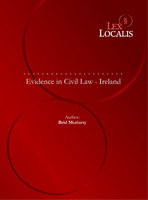Evidence in Civil Law - Ireland
| dc.contributor.author | Moriarty, Brid | |
| dc.date.accessioned | 2016-11-29 00:00:00 | |
| dc.date.accessioned | 2020-04-01T13:55:46Z | |
| dc.date.available | 2020-04-01T13:55:46Z | |
| dc.date.issued | 2015 | |
| dc.identifier | 620455 | |
| dc.identifier | OCN: 945783142 | en_US |
| dc.identifier.uri | http://library.oapen.org/handle/20.500.12657/31981 | |
| dc.description.abstract | Ireland as a common law jurisdiction operates an adversarial system. Ireland has a written Constitution, Bunreacht na h-Éireann. Other sources of law include legislation and European Union Law and a doctrine of precedent operates. This paper comprises a discussion of the law of evidence in Irish Civil Procedure. It follows the structure of a questionnaire circulated for the purposes of a comparative study as part of an EU wide project and is repetitive in parts. It was completed between November 2013 and August 2014 and in the interim there have been significant developments in the Irish legal system, most notably the establishment of the Court of Appeal and the Supreme Court decision in D.P.P. v. J.C. [2015] IESC 31, which modified the exclusionary rule concerning unconstitutionally obtained evidence. The primary form of proof in Irish courts is oral evidence. Competent witnesses are generally compellable. Usually testimony, on oath or affirmation, is given viva voce in open court before the Judge and where necessary a jury, and in the presence of the parties. The right to cross-examine is constitutionally guaranteed. In civil cases, the standard of proof is the balance of probabilities. The burden of proof rests on the party which asserts. The principle of audi alteram partem applies. A distinction is drawn between unconstitutionally obtained evidence and illegally obtained evidence. There is pre-trial discovery. Evidence taking by and for foreign courts is discussed. | |
| dc.language | English | |
| dc.relation.ispartofseries | Law & Society | |
| dc.subject.classification | thema EDItEUR::J Society and Social Sciences::JP Politics and government::JPH Political structure and processes | en_US |
| dc.subject.other | civil procedure | |
| dc.subject.other | foreign evidence | |
| dc.subject.other | cross-examination | |
| dc.subject.other | unconstitutionally obtainede evidence | |
| dc.subject.other | discovery | |
| dc.subject.other | witnessess | |
| dc.subject.other | evidence | |
| dc.subject.other | procedural law | |
| dc.subject.other | Affidavit | |
| dc.subject.other | Burden of proof (law) | |
| dc.subject.other | Common law | |
| dc.subject.other | Expert witness | |
| dc.subject.other | Ireland | |
| dc.subject.other | Lawsuit | |
| dc.title | Evidence in Civil Law - Ireland | |
| dc.type | book | |
| oapen.identifier.doi | 10.4335/978-961-6842-52-5 | |
| oapen.relation.isPublishedBy | cfc0db17-9c85-40be-996a-12c7cc16b807 | |
| oapen.relation.isbn | 9789616842525 | |
| oapen.pages | 120 | |
| oapen.remark.public | Relevant Wikipedia pages: Affidavit - https://en.wikipedia.org/wiki/Affidavit; Burden of proof (law) - https://en.wikipedia.org/wiki/Burden_of_proof_(law); Civil law (common law) - https://en.wikipedia.org/wiki/Civil_law_(common_law); Common law - https://en.wikipedia.org/wiki/Common_law; Cross-examination - https://en.wikipedia.org/wiki/Cross-examination; Evidence (law) - https://en.wikipedia.org/wiki/Evidence_(law); Expert witness - https://en.wikipedia.org/wiki/Expert_witness; Ireland - https://en.wikipedia.org/wiki/Ireland; Lawsuit - https://en.wikipedia.org/wiki/Lawsuit | |
| oapen.identifier.ocn | 945783142 |

